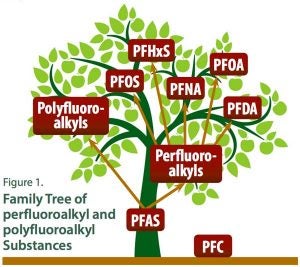
3M used PFAS since the late 1940s, continued disposing of them in Minnesota dumpsites until the 1970s, and completely phased them out in 2002, when 3M made an agreement with the EPA due to escalating concern about their effects. The chemicals leached into MN’s groundwater and contaminated residential wells. In 2004, traces of the chemicals were found in the drinking water of about 67,000 people in the state. In 2007, 3M signed an agreement with the state of Minnesota to finance cleanup of landfills and provide drinking water to contaminated communities. In 2010, Minnesota Attorney General Lori Swanson sued 3M stating that 3M knew the effects of PFCs* (perfluorinated chemicals), which includes PFAS, and still disposed of them improperly. The company argues that 3M fulfilled its legal obligations in its previous agreement with the state, and that its activities regarding disposal of the chemicals were legal at the time. Studies used by the attorney general from expert testimonies, including that of STEEP researcher Philippe Grandjean, stated experiments on lab specimen and surveys of community health confirm increased risk of adverse health effects due to PFC—including PFAS—exposure. Factors at risk include immune system functions, reproductive functions and cancer rates.
The day before trial was set to start, 3M and the state of Minnesota reached an agreement for $850 million. After the settlement, the Minnesota Attorney General’s office released a large number of documents that had not been previously public. Two documents are of particular note. One document describes the scientific publication strategy as seen from the perspective of the production industry. Another is a draft version of a published paper containing statistical results that were not included in final version (Olsen GW et al. JOEM 45: 260-270, 2003). Dr. Grandjean’s expert report for the State of Minnesota and reference list are also available online.
See news article: “3M, Minnesota settle water pollution claims for $850 million.” Tina Bellon, Reuters, February 20, 2018.
* In the past, scientists used the abbreviation PFC to stand for perfluorinated chemicals; however, the term PFC has fallen out of use in this context due to its confusion with other chemicals (specifically the perfluorocarbons that are better known as greenhouse gases), and newer materials often refer to PFAS instead. Of course, PFAS can also be broken down into more specific compounds, and you can learn more.

